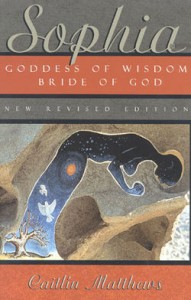Sophia – Goddess of Wisdom, Bride of God
By Caitlin Matthews.
430 Pages | First Quest Edition 2001, third printing 2009 | Quest Books, U.S.A. | ISBN: 9780835608015.
Sophia, or 'Wisdom' in Greek, has been revered in many forms throughout history. From the Dark Goddess of ancient Anatolia; to her Egyptian, Greek, Celtic, and Cabalistic manifestations; to her current forms as Mary and the orthodox St. Sophia. In the Gnostic Gospel of Thomas, Sophia sits with God until the creation. Then She falls into matter and becomes manifest in every atom, permeating all things 'like the sparks that run through charcoal', as Matthews says. While God is out there," the Goddess is in here: the mother-wit of practical inspiration and compassion at the heart's core.
' Anyone interested in the feminine face of God throughout the ages will find Sophia an illuminating experience. Caitlin Matthews' scholarship connects us to past, present, and future in the very depths of our femininity. ' - Marion Woodman, Jungian analyst and author of Bone: Dying into Life.
From Chapter 1 - 'The Black Goddess' (p. 6):
" The Black Goddess lies at the heart of spiritual knowledge, which is why her image continually appears within many traditions as the Veiled Goddess, the Black Virgin, the Outcast Daughter, the Wailing Widom, the Dark Woman of Knowledge. Our own search for the Goddess is one, that is begun in darkness and unknowing. Ours is the knowing ignorance of the child in the mother's womb: we have to be born, and we are frightened of the extra womb dimension. Once out of that womb, we begin to be terrified about our origins. But one of the prophecies of Sophia is: 'I will give thee the treasures of darkness and hidden riches of secret places. ' Those treasures of the Divine Feminine liep deep within us, waiting to be discovered . . . "
This definitive work comprehensively establishes a realistic Goddess theology for Westerners in the twenty-first century: - grounding spirituality in daily life and the natural world - learning to work playfully and play seriously - ending the gender war to enjoy sacred marriage Caitlin Matthews is a world-celebrated teacher of Western spirituality and author of over thirty books. With her husband and frequent coauthor John Matthews, she founded the Foundation of Inspirational and Oracular Studies, in their native Great Britain.
 Bezig met bijwerken...
Bezig met bijwerken...